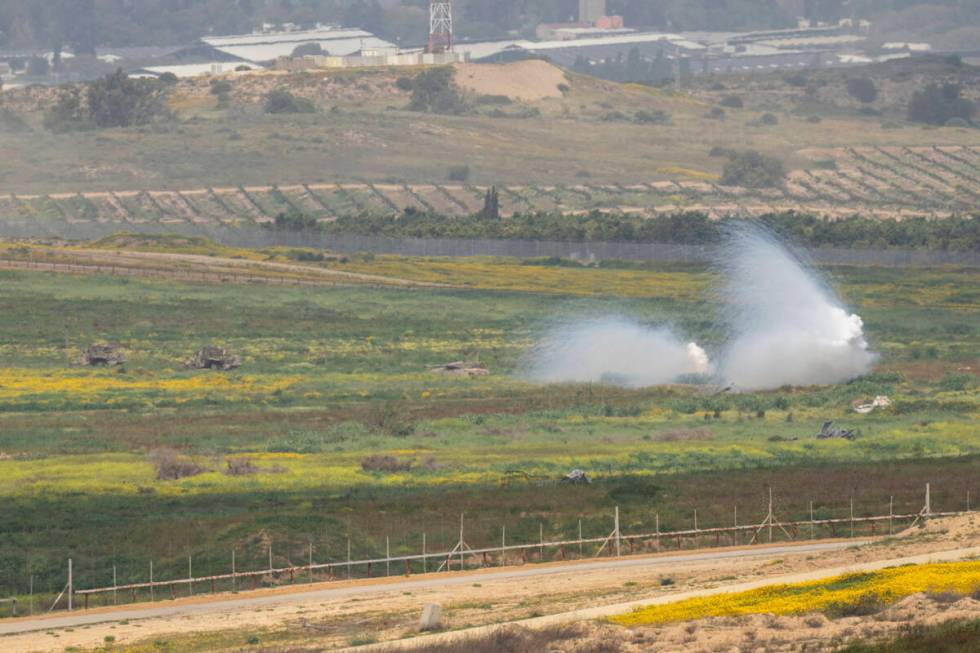Israel raids Gaza’s largest hospital, says terrorists regrouped there

RAFAH, Gaza Strip — Israeli forces launched another raid on the Gaza Strip’s largest hospital early Monday, saying Hamas terrorists had regrouped there and fired on them from inside the Shifa Hospital compound.
Clashes continued all day in and around the hospital, where Palestinian officials say tens of thousands of people have been sheltering.
The Israeli military said troops killed 20 people it identified as Hamas terrorists, and one of its own soldiers was killed, though the identification of the dead as terrorists could not be confirmed. Among those killed was a senior commander in Gaza’s Hamas-led police forces who Israel said was hiding in the hospital. Gaza officials said the commander was coordinating protection of aid convoys.
The army last raided Shifa Hospital in November after saying that Hamas maintained an elaborate command center within and beneath the facility. The military revealed a tunnel leading to some underground rooms, as well as weapons it said were found inside the hospital.
The raid on Shifa Hospital began before dawn, when Israeli forces backed by tanks and artillery surrounded the complex and troops stormed into a number of buildings.
Rear Adm. Daniel Hagari, the chief Israeli military spokesperson, said senior Hamas terrorists had regrouped in the hospital and were directing attacks from inside.
Among those killed in the raid was Faiq Mabhouh, a senior officer in the Gaza police, which is under Gaza’s Hamas-led government but distinct from the terrorist group’s armed fighting wing. The Israeli military said he was armed and hiding in Shifa, and that weapons were found in an adjacent room.
The Gaza government said Mabhouh was in charge of protecting aid distribution in the north and coordinating between aid groups and local tribes. Aid groups say Israeli strikes on police are one reason public order has collapsed, leading to desperate Palestinians overwhelming aid trucks on the road.
Hagari said the patients and medical staff could remain in the medical complex and that safe passage was available for civilians who wanted to leave.
Israel accuses Hamas of using hospitals and other civilian facilities to shield its fighters, and the Israeli military has raided several hospitals since the start of the war.
Hamas terrorists killed some 1,200 people in a surprise Oct. 7 attack into southern Israel that triggered the war, and took another 250 people hostage. Hamas terrorists are still believed to be holding about 100 captives, as well as the remains of 30 others, after most of the rest were freed during a cease-fire last year.
The Hamas-run Gaza Health Ministry said Monday that at least 31,726 Palestinians have been killed in Israel’s offensive. The ministry doesn’t differentiate between civilians and combatants in its count.
Meanwhile, famine is “imminent” in northern Gaza, according to a report issued Monday that warned escalation of the war could push half of Gaza’s total population to the brink of starvation.
The report came from the Integrated Food Security Phase Classification, or IPC, an initiative first set up in 2004 during the famine in Somalia that now includes more than a dozen U.N. agencies, aid groups, governments and other bodies to determine the severity of food insecurity.
Israel faces mounting pressure from even its closest allies to streamline the entry of aid into the Gaza Strip and to open more land crossings. Aid groups complain that deliveries by air and sea by the United States and other countries are too slow and too small.
A spokesman for the Israeli military body that deals with Palestinian issues, Shimon Freeman, said Israel “places no limit on the amount of aid that can enter the Gaza Strip” and encourages countries to send aid. Israel has accused U.N. bodies of failing to distribute aid in a timely manner. Aid groups say distribution is impossible in much of Gaza because of hostilities, the difficulty of coordinating with the military and the breakdown of law and order.
EU foreign policy chief Josep Borrell said it was up to Israel to facilitate more aid.
“Israel has to do it. It is not a question of logistics. It is not because the United Nations has not provided enough support,” he said.